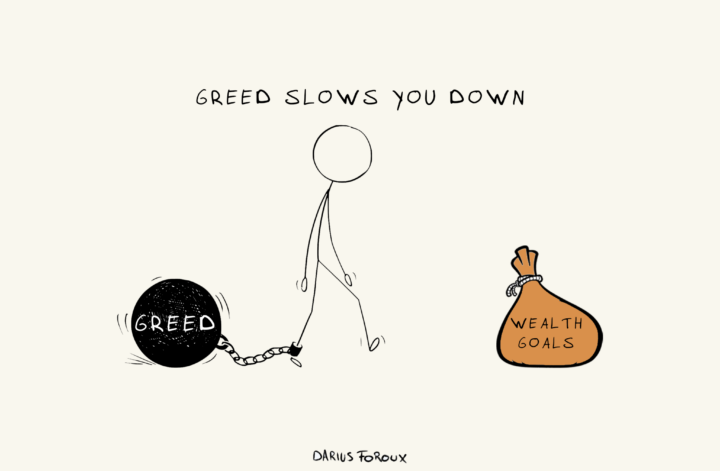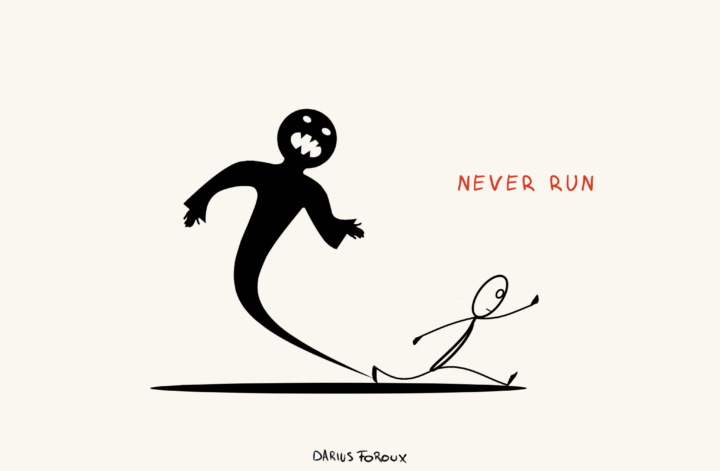Over the course of four essays, we will uncover why Stoic wisdom can make you wealthy. These essays combine Stoicism and investing. Here’s what you can expect.
Table of Contents:
Let’s get started.
Essay 1: On Greed
If you don’t get greedy, you can get wealthy
Everyone who loves the stock market knows the phrase, “Greed is good.”
That’s from one of my all-time favorite movies, Wall Street, starring Michael Douglas and Charlie Sheen.
The movie is from 1987, and it perfectly captures the greed that was widespread in the financial world. But greed is as old as the dawn of civilization.
And greed has always been one of the biggest obstacles to becoming wealthy. Because what does it even mean to be wealthy? If you ask me, I say, “To have freedom.”
It’s safe to say that freedom is a universal desire of human beings. After all, who doesn’t want to decide what to do with their life?
The first realization we must have when it comes to wealth and freedom is this:
- Money is a means to an end
- And that end is to live peacefully, on your own terms
- To have no stress and anxiety about your future well-being
That’s wealth. That’s true freedom.
The ancient Stoics provided a wealth of information about how to accomplish that.
I’ve been reading the works of Epictetus, Marcus Aurelius, Seneca, and other Stoics for 10 years now. And I was always surprised why no one talked about how valuable their lessons are when it comes to achieving financial freedom.
One of my first “money” lessons from Stoicism was about greed.
From the beginning, the Stoics encouraged their students to choose the middle path of life, also called the “golden mean.” They didn’t renounce the pleasures of society, nor did they run away from hardship. They offered a balanced view on every topic in life.
Seneca, one of the wealthier Stoics, talked about the golden mean in relation to money and its excess as follows:
“You ask what is the proper measure of wealth? The best measure is to have what is necessary, and next best, to have enough.”
But if you let greed creep into your system, you will never have enough. You will be obsessed with money. You will let your world revolve around it.
The relationship between greed and money often follows a U-curve. When we have little money, we’re greedy because we need more to live well. But when we have a lot of money, we tend to keep accumulating it for the sake of having more.
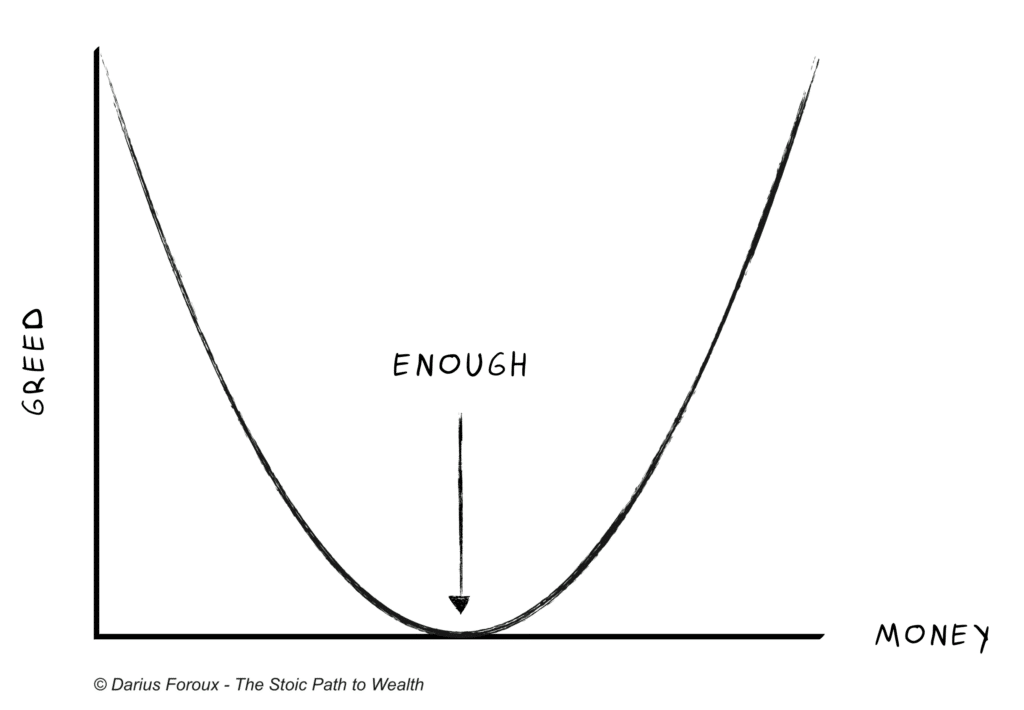
This is why it’s critical to neutralize greed. And let’s face it, we all have it in our system because it’s a human emotion.
We hear about how so-and-so made X dollars with crypto. Or we see our co-workers and friends drive the latest cars and fly off to Bali on vacation.
We start thinking, “What can I do to pay for those things?”
In those moments, we should remind ourselves that we don’t want to fall into that trap. Your freedom is more important than owning a big house or driving a fancy car.
Simply aim to have enough money.
As Jack Bogle, the founder of The Vanguard Group investment company, which has the second biggest global assets under management in the world, once said:
“Enough is one dollar more than you need.”
When we have enough money, we can be mentally and practically content with what we have.
That’s true freedom. When your mind is at peace with the present moment.
When you become too obsessed with chasing money, you sacrifice more important things. Like your health or time with people you care about. You can’t turn back time, no matter how much money you make.
Remember the age-old lesson of the Stoics: Money is a means. True wealth is about living a good life and having enough resources to fulfill one’s duties and responsibilities.
Stoic philosophy teaches us to be content with what we have and to practice moderation and simplicity.
Stay balanced!
-Darius
In next week’s edition, I cover another human emotion: Fear.
Meditate on this…
At the end of every main chapter of The Stoic Path to Wealth, I share a relevant quote from a Stoic philosopher. My goal is to turn these quotes into thought exercises.
I call these little segments “Meditate on this…” I want to share one about greed with you here.
“Contentment comes not so much from great wealth as from few wants.”
— Epictetus
Think about the last time you felt content and were appreciative of what you had. Now, think of the last time you were thinking about something you wanted.
I bet you have thought about something you wanted very recently. I do it all the time too.
Just remember to be content. That’s the best mindset to actually improve your life.
Essay 2: On Fear
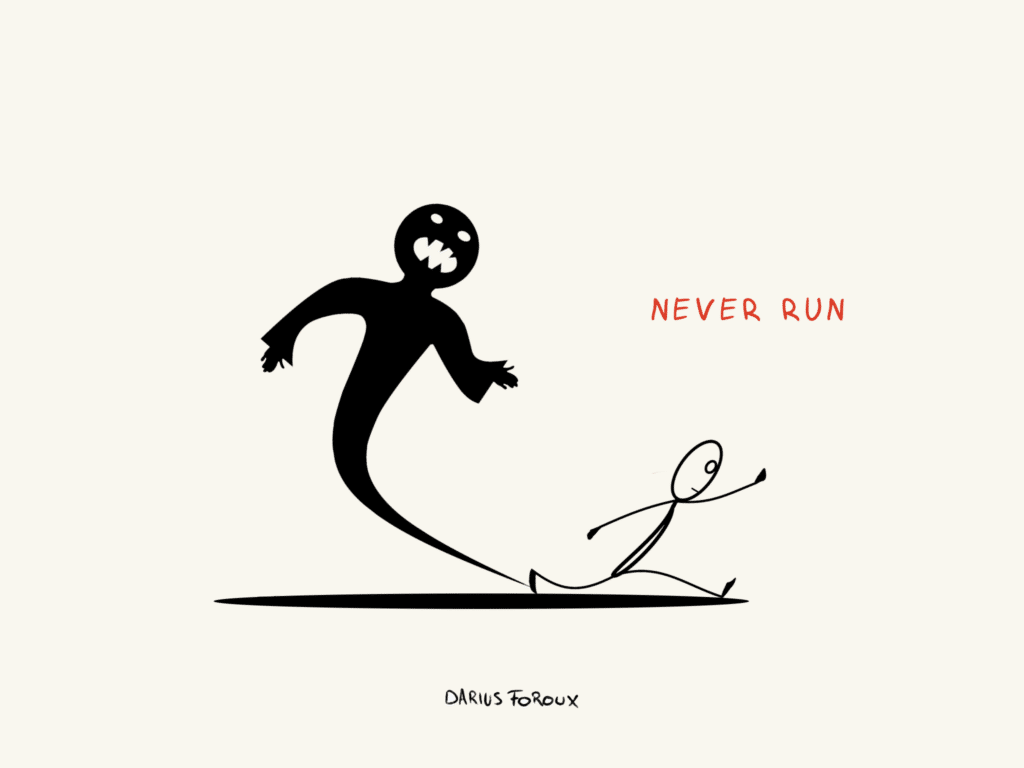
Get over the fear of losing money so you can make money
Money and fear. For so many of us, they go hand in hand.
- Some people fear losing the money they have
- Other people fear that they won’t be able to make money again in the future
It’s natural to fear loss. I’ve been there. I lost close to two-thirds of my money within a year when I first started investing.
It’s painful to lose a significant amount of money. And that fear of loss has affected me so badly in the past that I became afraid of getting back into investing.
This same fear makes many people avoid the stock market. But if we let this fear control us, we will never take any risk.
Just like in any other aspect of life, there will always be risks involved when it comes to wealth building. Whether that’s in the stock market, real estate, or starting a business – you can always lose money.
But the problem is that we often get too fearful. And as a result, we never even invest. If we do invest, we don’t invest nearly enough.
End result: You leave a lot of money on the table.
Look, we’ve all hear the same old story of, “Many of the richest people in the world built their wealth with stocks.”
Think of Warren Buffett, Jeff Bezos, Elon Musk. All their wealth is created through the stock market.
We also can invest in stocks. But for some reason, we get fearful.
- “What if I lose my money?”
- “What if there’s a recession?”
- “What if the dollar collapses?”
- “What if there’s another war or pandemic?”
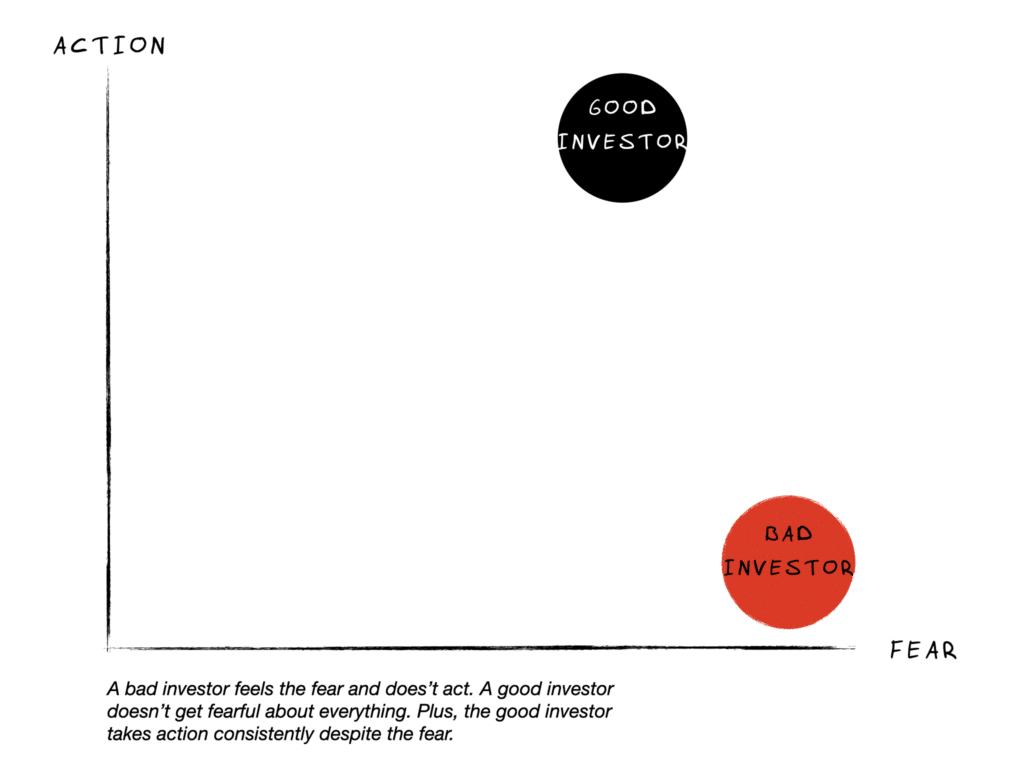
I get it. I’ve had those thoughts too. Especially if you spend some time on social media, you think the world is about to end.
But just look at the past 100 years. We’ve dealt with world wars, natural disasters, recessions, pandemics, currency issues, elections, social unrest… and yet, the stock market has gone up through everything.
What’s going to stop it if those things can’t stop it?
We need to overcome the fear of loss if we want to build long-term wealth. After all, when it comes to passive investing, losses are only temporary.
Marcus Aurelius said this about time:
“Time is like a river made up of the events which happen, and a violent stream; for as soon as a thing has been seen, it is carried away, and another comes in its place, and this will be carried away too.”
In a similar way, the stock market is also like a river, which keeps flowing no matter what’s going on in the world. Sometimes the current is faster or wilder than other times. But the river always flows in the same direction.
The stock market experiences its ups and downs, but on the whole, it keeps going up.
Those ups and downs are natural. Something temporary.
Acceptance of this nature takes away our fear of investing. When we zoom out and stop looking at the day to day moves, we realize that it’s more costly to not invest.
The main takeaway from the Stoics is this: Never fear something that’s natural.
Next week, we’ll see how we can combine the skill of managing both fear and greed to become a more consistent investor.
All the best.
-Darius
Meditate on this…
In my book, The Stoic Path to Wealth, I share stoic quotes related to investing. The stoics’ ancient wisdom is still highly relevant and applicable today.
“The wise man is neither raised up by prosperity nor cast down by adversity; for always he has striven to rely predominantly on himself, and to derive all joy from himself” – Seneca
We can neutralize our fear of losing money if we trust in our own ability to build sustainable wealth.
Everything starts with learning, which ultimately results in more confidence.
Essay 3: On Consistency

Consistency really pays off
Successful investing is not about figuring out what strategy is best; it’s about staying committed to a strategy that works. In today’s world, that’s one of the hardest things to do.
I honestly think it’s impossible to be consistent as an investor if you don’t have a clear-cut way of managing your emotions. You just have to spend 10 seconds on YouTube, Instagram, or X, and you’ve seen 20 people who all contradict each other.
- “Don’t invest in stocks! Buy real estate instead!”
- “The housing market is going to crash, buy gold!”
- “Everything’s going to crash, buy Bitcoin!”
And every person who’s preaching about their sure way of getting rich is a multi-millionaire. They pretend they have “the” solution to investing.
Howard Marks warned us against people who try to trick investors in his book Mastering the Market Cycle:
“I’ve seen dozens of silver bullets touted over the course of my 48‑ year career. Not one has proven out. No investment strategy or tactic will ever deliver a high return without risk, especially to buyers lacking a high level of investing skill.”
If there were silver bullets, we all would know about them. That’s not something you can keep secret.

Look, I’ve been investing for 17 years. I’ve read every single important investing book there is. I’ve talked to extremely wealthy people.
The secret to building wealth is simple: Pick an investing strategy, and execute it without diverting an inch. Stay the course.
My father’s best friend is an accountant who works with some of the wealthiest people in The Netherlands. The other day, we were having lunch when the topic of building wealth came up.
“Most of my wealthy clients inherited money and simply got richer,” my father’s best friend said. “And then there’s a smaller group who started from nothing. They just got a little bit wealthier year by year.”
This is the harsh reality that no one really talks about. You don’t really hear it on social media.
If you want to be wealthy, you don’t have to hit a home run. Forget about the people who make hundreds of thousands or millions a month. The odds of accomplishing that are extremely low.
We’re much better off when we aim to just get a little bit wealthier every year. This also aligns with the Stoic way of life. Epictetus, one of the more stringent Stoics, once said:
“No great thing is created suddenly, any more than a bunch of grapes or a fig. If you tell me that you desire a fig, I answer you that there must be time. Let it first blossom, then bear fruit, then ripen.”
In a similar way, if you tell me you desire wealth, I answer you that there must be time.
Earn a living. Save your money. Invest. Repeat.
All the best.
-Darius
P.S. Next week we’ll tie all the topics we’ve covered until now (greed, fear, consistency) together into the ultimate outcome: Financial freedom.
Meditate on this…
“First say to yourself what you would be; and then do what you have to do.” — Epictetus
Take a moment and think about what you currently are not doing, but wish to do.
This could be related to investing and wealth or any other area of your life. What aspect of your life do you want to improve?
Now, open a note on your phone or grab a notebook and write those things down.
Then, take these desires and translate them into actions. What exactly do you have to do daily to become what you want to be?
Start executing. Now it’s only a matter of time before you actually become what you want.
Essay 4: On financial independence

This is the fourth and final essay I’ve published every Thursday, leading up to the launch of my book, The Stoic Path to Wealth.
Through these four essays, we will uncover why Stoic wisdom can make you wealthy. If you missed the previous edition, read it here.
You don’t need to be rich to feel financially free
Many of us have an unhealthy obsession with early retirement and financial freedom. We work hard, save diligently, invest consistently, and we wait…
We live our lives in a waiting room. “I will enjoy my life when I retire early.”
What’s a goal or outcome you’re waiting for to happen?
- A promotion
- Getting a degree
- Starting your own business
- Having a certain amount of money
The Stoic philosopher Seneca often talked about how we tend to neglect the present. When Seneca retired from active life in Ancient Rome, he started to write letters to his friend, Lucilius, who was still in the midst of his career.
In one of those letters, he reminded his friend that, “While we are postponing, life speeds by.”
We postpone our happiness and contentment until a future moment. But all the while, time passes. We continue to age.
And if we live our lives like that, we will inevitably come to the following conclusion at some point: Nothing in life is worth waiting for.
As Seneca also said: “Begin at once to live, and count each separate day as a separate life.”
If you want to have more financial freedom, you really don’t need to be rich to feel that way. You can start taking action now and you can accomplish that feeling much faster.
Here are a few ways you can feel financially free:
- Form the habit of spending less than you earn
- Be content with what you have
- Stop complaining
- Think in opportunities
- Do the right thing, day in and day out
This might sound very simplistic, but I guarantee you it works.
Just like millions of other people, I was obsessed with financial freedom when I was growing up. I fantasized about retiring early from the moment I had my first summer job when I was in high school.

“Oh man, I can’t wait to get rich so I don’t have to ever work again.”
I went through life like that until I was about 30. I was waiting until I would have enough money so I could just stop working.
But through reading philosophy and writing about financial freedom, I realized I was after the wrong thing. I was obsessed with the “financial” aspect of freedom.
I learned that you can have a sense of financial independence without being very wealthy. What matters more is that you go through life with “mental freedom.”
When your mind and spirit are free from fear and greed, you can live in the present moment.
Especially when you can become consistent with your habits, you can become truly free.
To me, this type of freedom is much more important than just having a lot of money.
This is a cliche, and I bet you’ve heard it many times, but we’ve all heard about the extremely wealthy people who are unhappy or depressed. If money was the answer to anything, every rich person would be happy without exception.
We know that life isn’t that simple. I would take mental freedom over pure financial freedom any day of the week.
Here’s when you know you’ve accomplished mental freedom:
- No fear of going broke
- No desire to acquire material objects
- Content with your existing lifestyle
- A healthy drive to improve yourself
- Driven to make an impact in the world
One of the main topics of The Stoic Path to Wealth book is that you will feel mentally free once you start taking the steps towards financial freedom.
If you’re doing all the right things, it’s only a matter of time before you build substantial wealth.
So you can just relax and enjoy the present moment.
All the best.
-Darius
P.S. I hope you enjoyed these four essays. If you want to dive deeper into Stoicism, wealth, and freedom, read my book, The Stoic Path to Wealth.
Order The Stoic Path to Wealth
My new book, The Stoic Path to Wealth (Portfolio / Penguin), is out now.
If you order now, you will instantly get free access to 4 products, worth over $500.
Learn more here: stoicpathtowealth.com


